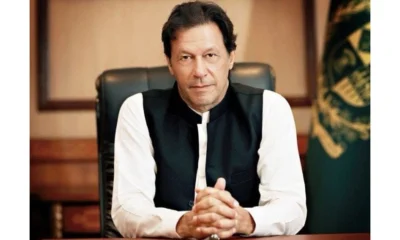Amidst Imran Khan led Pakistan Tehreek-s-Insaf (PTI)’s ongoing efforts to muster support of smaller parties to form the new government, Pakistan Muslim League-Nawaz and Pakistan Peoples’ Party, having secured second and third position in the national assembly polls, have agreed to play opposition role by formulating a “coordinated joint strategy”, if PTI manages to form its government at the Centre.
According to Dawn, the broad-based understanding between the two major parties, was reached during the first direct meeting between their leaders after the July 25 general elections in Islamabad on Sunday.
Mushahid Hussain Sayed, the former minister and a prominent PML-N leader said, “It was an ice-breaker,” The meeting was held at the residence of former National Assembly speaker Sardar Ayaz Sadiq.
He said, “It was a very good meeting and you can call it a meeting of the minds,” saying that there was complete unanimity of views between the two parties that the “July 25 elections have been stolen”.
Read More: Imran Khan poised to become Pak PM, though party 22 short of majority
Both sides were of the view that they should “completely reject” the election results and should adopt “a coordinated joint opposition strategy” to give a tough time to the Imran Khan-led PTI government while staying inside parliament.
 Sayed said the leaders of the two parties would meet again on Monday as the PML-N had told the PPP representatives that it would inform them about its decision on a proposal of the Muttahida Majlis-i-Amal (MMA) to boycott parliament. He said the PPP delegation had informed the PML-N that they were not in favour of boycotting parliament.
Sayed said the leaders of the two parties would meet again on Monday as the PML-N had told the PPP representatives that it would inform them about its decision on a proposal of the Muttahida Majlis-i-Amal (MMA) to boycott parliament. He said the PPP delegation had informed the PML-N that they were not in favour of boycotting parliament.
The PPP delegation comprised former PM Yousuf Raza Gilani, Sherry Rehman, Qamar Zaman Kaira and Farhatullah Babar while the PML-N was represented by Mushahid Hussain Sayed, Ayaz Sadiq, former prime minister Shahid Khaqan Abbasi and Sardar Mahtab Ahmed Khan.
Read More: Afghanistan, Not India, Will Be Imran Khan’s Priority Until 2019
After the landmark meeting with PML-N, the PPP delegation held talks with Jamiat Ulema-i-Islam (JUI-F) chief Maulana Fazlur Rehman and tried to persuade him to reconsider his decision of boycotting parliament.
Sherry Rehman said they had urged the JUI-F chief not to boycott parliament because by “vacating the space we will be providing a walkover” to the PTI.
In the post 2002 election scenario, PPP and PML-N had forged Alliance for the Restoration of Democracy (ARD) — under Nawabzada Nasrullah Khan. The Muttahida Majlis-e-Amal (MMA) was another opposition alliance in parliament at that time.
Read More: US Questions Fairness of Pakistan Elections, UN Praises Commitment To Democracy
The members of the ARD and MMA had given a tough time to the military government of Gen Pervez Musharraf who had picked Zafarullah Jamali as the prime minister. Over 100 members of the two alliances kept parliament non-functional for a record almost one year through noisy protest against the Legal Framework Order of the military regime, forcing the government to hold talks with the opposition.
The issue was resolved when the MMA entered into an agreement with the military-led civilian regime and parliament approved the controversial 17th Constitution Amendment giving indemnity to the acts of Gen Musharraf, including the amendments he had made to the Constitution.
Read More: Army and IS involvement in Pakistan election a matter of concern
Dawn reports that political analysts and experts believe that the new parliament will be a reflection of the 2002 assembly when the government had to face a tough opposition in the form of the ARD and MMA.
According to the country’s election commission PTI has won 115 seats in 270-seat national assembly while PML-N won 64, PPP-43 while smaller parties and independents have won 36 seats. Election for two seats has been postponed for some technical reason.
PTI has secured clear majority in Khyber Pakhtunkhwa provincial assembly with 66 out of 77 seats, PPP has secured victory in Sindh provincial assembly with 76 out of 130 seats. In Punjab no party has won clear majority with PML-N winning 129 seats out of 295 seats while PTI legged behind by winning 123 seats. In Balochistan provincial assembly- Balochistan Awami Party secured 15 seats out of 65 while remaining seats are scattered among nine political parties.
Meanwhile, there are reports that India has intensified contacts with Imran Khan’s PTI in the run-up to government formation. Indian High Commission In Islamabad remains in touch with senior party leaders, who are likely to play an important role in the new government.
Officials in New Delhi have not ruled out the possibility of PM Modi making a congratulatory phone call to Imran Khan, who is likely to take oath of office on 14 August, the independence day of the country.


 India News21 hours ago
India News21 hours ago
 Latest world news21 hours ago
Latest world news21 hours ago
 Latest world news7 hours ago
Latest world news7 hours ago
 Latest world news7 hours ago
Latest world news7 hours ago
 India News7 hours ago
India News7 hours ago
 Latest world news6 hours ago
Latest world news6 hours ago
 India News6 hours ago
India News6 hours ago














